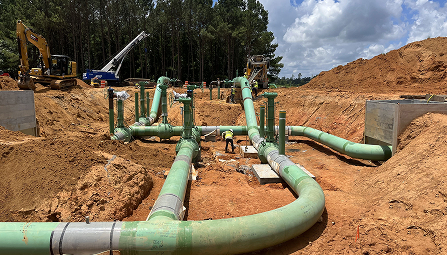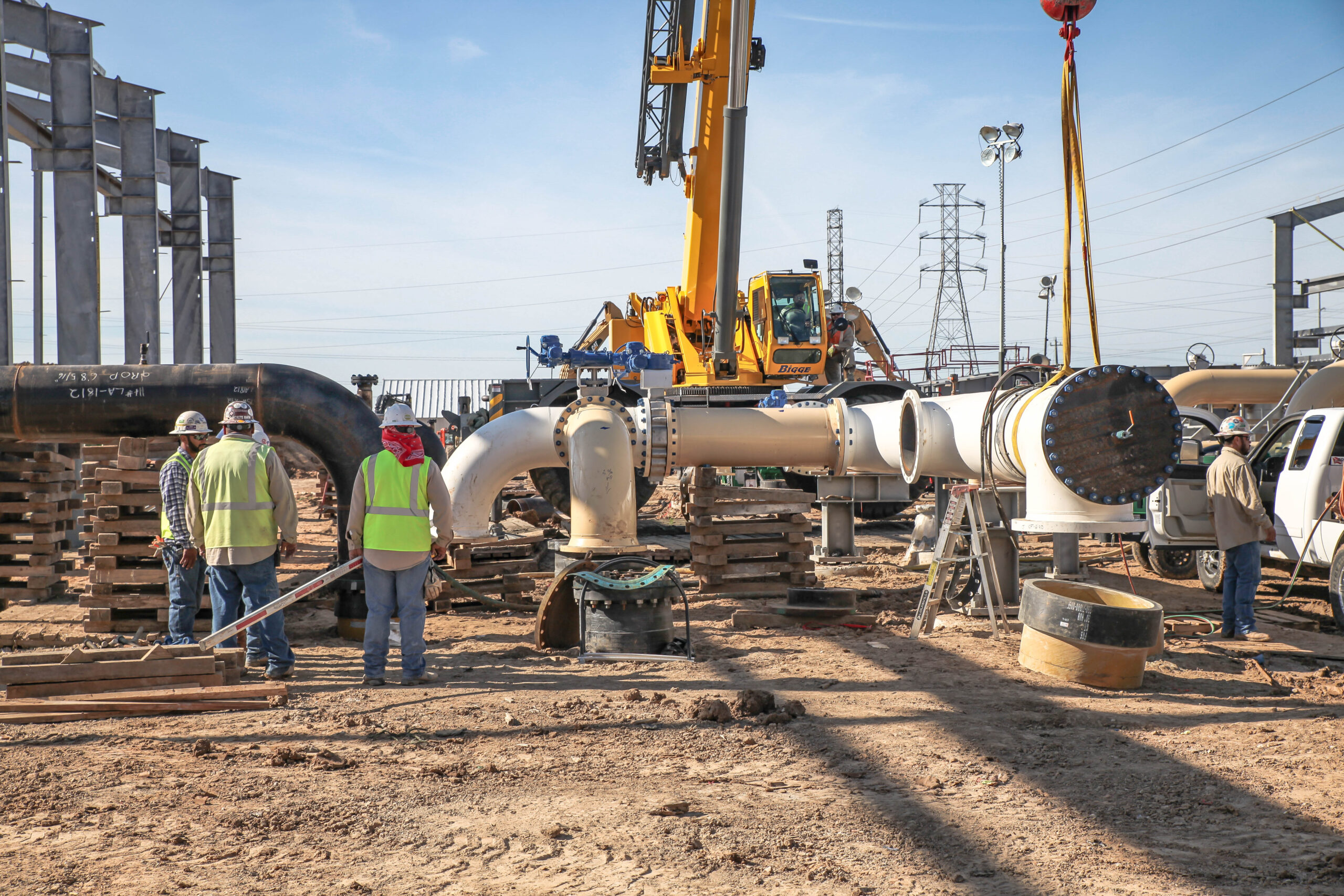How to Compare Pipeline Construction Services Bids Like a Pro
Wiki Article
The Essential Overview to Comprehending Pipeline Construction Solutions and Their Relevance
Pipeline Construction solutions are basic to the transportation of essential sources such as gas, water, and oil. These solutions include thorough planning and execution, sticking to stringent security and environmental standards. As the market adapts to modern obstacles, understanding its elements and ramifications becomes increasingly essential. What factors contribute to the growing relevance of these solutions in today's economic climate? The following areas will check out these critical elements.Introduction of Pipeline Construction Services
Pipeline Construction services encompass a series of activities important for the installment and upkeep of pipes used to carry numerous materials, including oil, water, and gas. These services are important for guaranteeing the secure and reliable movement of resources from one location to another. The process commonly starts with comprehensive preparation and style, which takes into account regulatory requirements, environmental factors to consider, and logistical obstacles.As soon as planning is complete, excavation and grading of the land are performed to prepare the site for Pipeline setup. This is adhered to by the real laying of the pipes, which includes welding or signing up with areas together to produce a continuous flow path. After installation, strenuous screening is performed to guarantee stability and security. Upkeep solutions are additionally offered to attend to any kind of concerns that may emerge gradually. Overall, Pipeline Construction solutions play a critical duty in sustaining facilities for energy and water distribution.
Trick Parts of Pipeline Construction
A successful Pipeline Construction job depends on numerous vital elements that ensure the secure and effective installment of the Pipeline system. Complete site evaluations are essential, as they identify the geographical and ecological factors that might impact Construction. Next off, the option of ideal products, such as pipelines and fittings, is vital for securing longevity and compatibility with the transferred materials.Furthermore, advanced Construction strategies, consisting of trenchless technology and directional boring, enhance effectiveness and decrease environmental impact. Effective task management is an additional important part, working with labor, tools, and timelines to satisfy project objectives.
Additionally, communication among stakeholders, consisting of engineers, professionals, and local authorities, guarantees positioning on job requirements and demands. Complete top quality control steps throughout the Construction procedure make certain conformity with industry standards and maximize the Pipeline's operational life-span. Collectively, these parts develop the backbone of a successful Pipeline Construction job.
Security Requirements and Regulations in Pipeline Construction

Improving Governing bodies, such as the Occupational Safety And Security and Health Administration (OSHA) and the Pipeline and Hazardous Materials Safety And Security Administration (PHMSA), stated particular demands that govern Construction techniques. These include procedures for tools usage, employee training, and emergency situation action treatments. By implementing these criteria, Construction companies not just safeguard their staff members however additionally protected public count on. Inevitably, rigorous safety actions add to the long-term success of Pipeline tasks, ensuring they satisfy both ecological and functional assumptions.
Ecological Factors To Consider in Pipeline Projects

Ecological factors to consider are important to the planning and implementation of Pipeline projects. These projects need to assess prospective influences on ecological communities, water sources, and neighborhood wild animals. Carrying out detailed environmental impact assessments (EIAs) is essential, allowing stakeholders to determine and mitigate dangers prior to Construction starts.
Securing delicate locations, such as environments and wetlands, often calls for executing certain style functions or different routing to reduce disruption. Additionally, Pipeline operators are tasked with creating techniques for preventing spills and leaks, which can have terrible impacts on the environment.
Involvement with regional communities is vital, as public problems can cause project alterations that boost environmental management. Conformity with regulations established by environmental agencies assures that projects meet sustainability standards, fostering an equilibrium in between infrastructure needs and ecological preservation. Inevitably, dealing with environmental factors to consider not only safeguards nature however additionally advertises community depend on and job viability.
The Role of Technology in Pipeline Construction
Innovation plays a crucial role in modern-day Pipeline Construction, boosting performance and precision. Advanced surveying strategies permit for specific preparation and implementation, reducing ecological effect and project hold-ups. In addition, the assimilation of automation and robotics simplifies operations, reducing labor costs and boosting security on Construction websites.Advanced Evaluating Strategies
Advanced surveying techniques play a necessary duty in the effective implementation of Pipeline Construction tasks. These techniques utilize cutting-edge innovation to ensure specific mapping and evaluation of the surface where pipelines will be mounted. Methods such as Geographic Details Systems (GIS), LiDAR (Light Discovery and Ranging), and 3D modeling allow designers to envision and analyze the landscape, identifying ecological concerns and possible obstacles. By utilizing these innovative devices, groups can boost accuracy ready and positioning, significantly lowering the threat of errors during Construction. Furthermore, real-time information collection enables immediate modifications and notified decision-making throughout the project lifecycle. Ultimately, these surveying advancements add to enhanced efficiency, safety, and sustainability in Pipeline Construction efforts.Automation and Robotics

Economic Impact of Pipeline Infrastructure
Pipeline framework plays an important function in facilitating and forming local economies trade. By supplying a trusted means of delivering oil, gas, and other assets, pipes decrease transportation expenses and boost supply chain effectiveness. This infrastructure attracts investment, stimulates job creation, and cultivates financial development in bordering areas.Furthermore, the Construction and maintenance of pipelines contribute significantly to neighborhood economies, producing many job opportunity in various industries, from engineering to labor. The influx of work typically causes enhanced spending in neighborhood read this post here services, additionally boosting financial task.
Furthermore, pipelines boost energy safety and security by making sure a secure supply of resources, which is essential for industrial procedures and domestic needs. As regions come to be interconnected through Pipeline networks, they get to broader markets, raising competition and financial resilience. As a result, the economic effect of Pipeline framework is diverse, affecting both prompt local economic climates and more comprehensive regional advancement.
Future Fads in Pipeline Construction Services
The future of Pipeline Construction solutions is evolving in response to technical developments, governing changes, and expanding ecological factors to consider. Innovations such as robotics and drones are streamlining evaluation and maintenance procedures, improving security and effectiveness. Automation is positioned to lower labor costs and raise accuracy in Construction procedures. In addition, the enhancing emphasis on sustainability is prompting firms to adopt environmentally friendly materials and techniques, aligning with global efforts to decrease carbon footprints.Governing frameworks are likewise adapting to attend to ecological influences, pushing for higher openness and responsibility in Pipeline projects. The integration of clever technologies, have a peek at these guys consisting of real-time tracking systems, is expected to boost the reliability and performance of Pipeline networks. As energy demands change toward renewable resources, Pipeline Construction solutions will likely see an increase in tasks connected to biofuels and hydrogen transportation. On the whole, these fads show a transformative period for the Pipeline Construction industry, concentrated on advancement and sustainability.
Often Asked Questions
What Types of Pipelines Are Frequently Constructed?
Various sorts of pipes are frequently built, including oil, sewer, water, and gas pipelines - Pipeline Construction Services. Each serves distinctive functions, helping with the transportation of vital resources throughout areas while sticking to safety and environmental lawsFor how long Does a Typical Pipeline Project Take?
The period of a regular Pipeline task varies substantially, commonly ranging from a number of months to a few years. Aspects affecting this timeline consist of project complexity, governing authorizations, and ecological factors to consider that must be dealt with.That Controls Pipeline Construction Business?
Pipeline Construction firms are managed by various government, state, and neighborhood firms, including the Pipeline and Hazardous Materials Safety Administration (PHMSA) and state public utility compensations, guaranteeing compliance with safety and security and environmental criteria throughout the Construction process.What Are Common Products Made Use Of in Pipeline Construction?
Common products made use of in Pipeline Construction include polyethylene, pvc, and steel. Each product provides distinctive advantages such as adaptability, toughness, and resistance to corrosion, making them suitable for numerous applications in carrying gases and fluids.
Exactly How Are Pipeline Construction Expenses Estimated?
Pipeline Construction prices are approximated by analyzing aspects such as material expenditures, labor rates, task intricacy, environmental considerations, and governing needs (Pipeline Construction Services). Accurate expense evaluation assurances efficient budgeting and project planning throughout the Construction processPipeline Construction services include a range of tasks vital for the setup and maintenance of pipes utilized to carry various substances, consisting of water, oil, and gas. An effective Pipeline Construction job depends on numerous crucial components that assure the efficient and safe setup of the Pipeline system. Advanced evaluating techniques play a crucial role in the successful execution of Pipeline Construction tasks. Numerous kinds of pipelines are frequently created, consisting of oil, gas, sewer, go now and water pipelines. Pipeline Construction expenses are estimated by evaluating factors such as product costs, labor prices, project intricacy, ecological considerations, and regulative requirements.
Report this wiki page